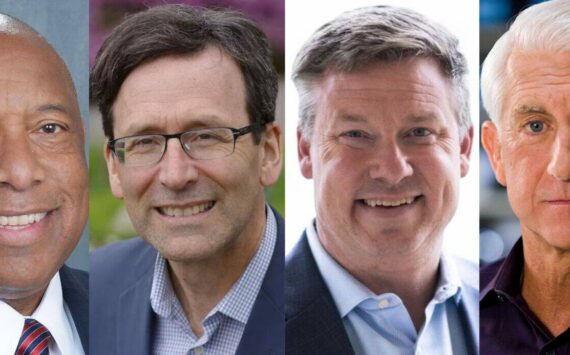Lakeside School, Seattle’s venerable private prep academy, is experiencing an extended “teaching moment.”
That translates as “trying to recover from a major screwup.”
The school, famous for alums Bill Gates, Paul Allen, and various assorted other billionaires (and, full disclosure, nonbillionaire Mossback), invited conservative author Dinesh D’Souza to speak in March. When the faculty heard about it, some of them freaked out. Though D’Souza is a fellow at Stanford’s Hoover Institution, a former Reagan White House policy adviser, and a well-known pundit of East Indian descent, many objected in particular to his views on race, as outlined in his 1995 book, The End of Racism. Though not invited to discuss race per se—Iraq and empire were the topics—his views opposing affirmative action and questioning distinctly racial views of slavery and segregation were apparently beyond the pale. One Lakesider likened him to a Holocaust denier.
Under pressure, the school’s head, Bernie Noe, rescinded the invitation. In a formal statement, Lakeside explained that “we realized Mr. D’Souza’s presence could cause emotional pain to many at our school, including our increasingly diverse student body.”
The clear implication was that students, faculty, and staff at one of the country’s premier college prep academies couldn’t handle the ideas of a mainstream conservative. That’s an odd signal coming from an institution known for academic rigor.
Parents across the ideological spectrum were upset at the cancellation. D’Souza kept his $10,000 speaker’s fee and used it to compensate himself for the time he spent complaining about political correctness run amok on talk radio and Fox News’ Hannity and Colmes.
When I asked D’Souza about the brouhaha, he expressed exasperation at the sensitivity of his critics. “I am coming to speak on one day,” he said. “If they think what I am saying is so awful, they have the rest of the year to refute it!” He makes a good point. In the name of protecting the value of racial diversity, the school chose to limit intellectual diversity. (Lakeside says it is close to signing up a new conservative speaker, by the way.)
So, this fiasco—er, “teaching moment”—raises questions. What is so egregious about D’Souza’s racial views that he has become a Lakeside pariah? Is the school being held hostage by the PC police? Is it so racked with white guilt that it is overprotecting minority students? And if D’Souza is the moral equivalent of a Holocaust denier, why does Lakeside send so many grads to Stanford, where he works?
It was a mistake to disinvite D’Souza. Given that, it’s worth asking: What is Noe trying to protect? It turns out that the school is undergoing a voluntary, self-imposed transformation that, according to Noe, is worth far more than the “distraction” of having D’Souza speak.
Most people know that Bill and Melinda Gates have donated more than $1 billion to reshape public education, but few are aware they’ve also donated tens of millions of dollars to a fundamental reshaping of Bill’s alma mater. Last fall, the school embarked on a $105 million campaign designed, in part, to fund a new commitment to diversity and the globalization of its academic program. The Gateses have donated $40 million to help kick off the campaign (Bill’s sister, Libby Armintrout, also an alum, is president of Lakeside’s board of trustees). Why give millions to an already flush school (tuition runs about $20,000 per year)? Because this bastion for privileged kids is attempting to reach beyond privilege.
The reinvention comes in several parts. One is to make the school—faculty, staff, and students—more diverse racially, ethnically, and economically. Forty-five million dollars of that $105 million would allow the school to provide financial aid to a degree that students could be chosen without regard to ability to pay. More money would fund the school’s outreach programs to minority and other groups. Another chunk would pay for more Lakesiders to work and study abroad. The purpose is to show students, in Noe’s words, that “life is not all about you.”
Gates himself has preached that message. In a speech at Lakeside last September, he drew on his own experience working for global health. “If rich people saw millions of impoverished mothers burying babies who died from causes we can prevent, we would insist that something be done, and we would be willing to pay for it,” Gates said.
“We have a responsibility to the world,” adds Noe, “to teach our students to do something more than accrue more privilege.” It’s hard to dispute the worthiness of that, especially given Lakeside’s goal of “growing” tomorrow’s leaders.
In an even more utopian vein, the school seems to think that it can also turn its campus—which looks like a well-endowed private college—into a nurturing nest of multiculturalism, a place where everyone feels valued and understood. Thus, Noe’s concern about D’Souza’s visit causing “emotional pain.”
But while this might be a tender time in the school’s evolution, “diversity” can also be a code word for a decision to tippy-toe around debate, conflict, and true difference. Pluralism is great, but the push to value everything and everyone equally can inject a kind of Novocain into schools. No academic environment worth its salt can make everyone feel welcome and valued. No. 1, you can’t control how people feel, unless you’re a cult. No. 2, it’s not the truth. Not everyone will be equally valued or welcomed, especially by their peers. This is high school and middle school, after all, and a meritocracy.
A pain-free education is a contradiction in terms and not worthy of Lakeside’s more commendable goals.







